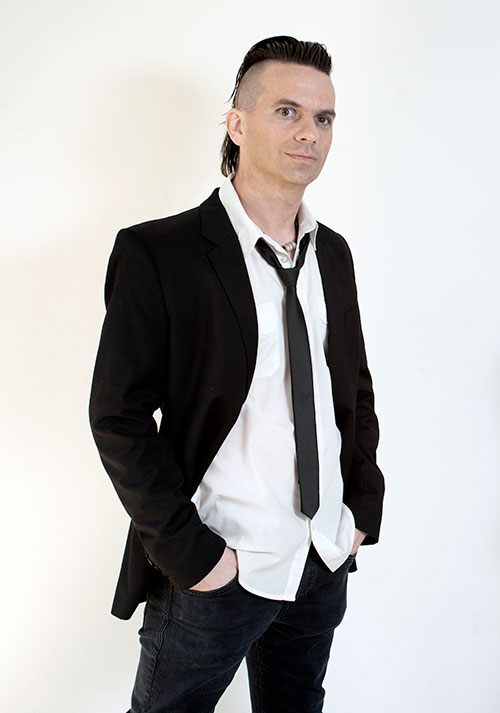About Guitar Studio
Baustein Guitar Studio, in short “Guitar Studio”, was founded in 2000 by producer, composer and performer Baustein. The story started with some people asking him to teach them how to play the guitar.
Learn music by playing, don’t play music by learning! (GS)
The alternative teaching method, “The American Way” like he was trained, was enthusiastically received by his music students, and the reputation of Guitar Studio started circulating. Due to the increasing popularity, the number of applications started to increase from all corners and sides of Belgium.

As a result, it quickly became a full-time activity for Baustein, combined with live performances and writing and producing music. Over the years, Baustein Guitar Studio became an established name in Belgium, and the students know that they can expect top notch quality and no-nonsense lessons at all levels from starter to professional, for young and old.
In the meantime, the offer was expanded with guitar lessons (electric and acoustic), drum lessons, band coaching (live playing workshops), songwriting, composition, ear training, etc. Musicians who choose Guitar Studio know that they are not just a guitar lesson. Regular guitar lessons and how-to-play guitar can be found everywhere, even for free on YouTube. Choosing Guitar Studio means choosing top notch quality, expertise, no-nonsense, contemporary vision, important: choosing NO school!

MEET YOUR COACH & MENTOR

Welcome! I am Baustein, your coach and mentor. I am professional producer, songwriter, multi-instrumentalist and DJ. I often work with other artists, but my own releases can be found under DJ Manic Youth and KONKR33T. I’ve been running Guitar Studio since 2000, and I’m the co-founder of Groove Hunter Entertainment Group and Manic Collection.
I started Guitar Studio in the year 2000 from my passion for guitar and music. I studied at the Antwerp Jazz Studio, and the well-known Musicians Institute Hollywood, College Of Contemporary Music, where music was more than just “finger plucking” on guitar or just playing in a band. Playing music is only a small part of a musical career, I even dare to say no more than 5% of the time. Think of it like a doctor: how much of his time is he actually spending on medicine? In a nutshell, my time in Los Angeles was an eye-opener in many areas, where the sessions with former KISS manager/producer Kenny Kerner influenced me most.
Kenny, of Jewish descent, a heart of gold, respectful, honest, business guru, someone who never minced his words. That’s why he wasn’t the most famous lecturer of the College. His sharp tongue sometimes felt like a Viking sword in the back. Truth can be painful, which is why people like to prefer comfortable lies to painful truth, and many people make no progress in their lives. That unpleasant truth is just as valuable.
By confronting himself, a person can make progress and develop and design his future. This applies to an artist, musician or instrumentalist, composer, band, work life up to and including private life. Self-development, motivation, getting out of the comfort zone, beat fears, rewarding themselves, gaining knowledge, using existing knowledge, networking, to-do lists, setting targets, life goals and deadlines.
A successful artist is a good actor and tough businessman.
WHAT TO EXPECT FROM GUITAR STUDIO
• Technical exercises, reading exercises, analysis, coordination, motor skills training, etc
• Music styles: rock, pop, funk, blues, punk, R&B, …
• Ear training: being able to play and improvise your favorite music faster by ear
• Guitar notation, musical notation, learning to make summaries, listening exercises, analysis and ear training
• How to convert chords and chord notations from the internet or scores into chords for guitar (e.g. piano tracks with more complex chords)
• Mute strings (palm muting and damping) with your left and right hand for more attack, expression and drive on guitar without too much noise.
• Extend existing chords into colorful and unusual chords
• Play riffs and solos as they should in different genres such as Pop, Punk, Rock, Metal, Blues, Funk, etc.

With rhythm exercises and listening exercises, the basic sense of rhythm is developed (timing). This is very important in the initial phase for starters, but also for other musicians it is necessary to continuously train from rhythm and timing.
That you need a bit of musical aptitude and musical sense to be able to play music is true, but the largest part consists of practice. Let’s say, you need 10% musical aptitude, and 90% percent practice. So if you have no musical aptitude, you can still become 90% a good musician!


